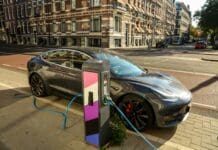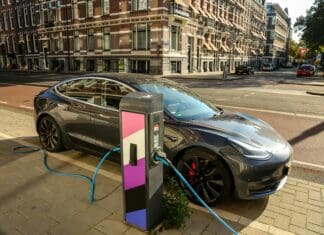This post is also available in:
 עברית (Hebrew)
עברית (Hebrew)
The quantum computing age is coming and with it a serious threat to encrypted communications. Current cryptography protocols used to secure our data can be cracked by a quantum computer in no time at all. This means that state secrets, medical records, and banking systems would all be vulnerable once the quantum computer becomes a reality.
But the power of quantum technologies can be used against quantum technologies, and protect our data against quantum hacking. Eindhoven University of Technology is currently setting up a unique testbed to validate this technology in several societal settings, thus paving the way for a fast and unhackable quantum internet. Taking autonomous driving as the first use case, the researchers aim to have the world’s first quantum-secured autonomous driving car ready by next year.
Prepared to dive into the world of futuristic technology? Attend INNOTECH 2022, the international convention and exhibition for cyber, HLS and innovation at Expo, Tel Aviv, on November 2nd – 3rd
Interested in sponsoring / a display booth at the 2022 INNOTECH exhibition? Click here for details!
Idelfonso Tafur Monroy, TU/e Professor at the Electro-Optical Communication group and the Center for Quantum Materials and Technology Eindhoven (QT/e) recognizes the particular threat to systems that require a lot of accurate control, such as autonomous driving. “For example, a hack could trick others into thinking your car is in a different location, slowing down, or changing direction,” he says. “It is even possible that your car is hacked and commandeered by someone external to the vehicle.”
The immense computing power of quantum is especially useful in calculations with many different outcomes: these can be done in one operation at the same time. To crack current encryption, a conventional computer takes longer than the age of the universe to try-out every possible solution. A quantum computer tries them all at once and cracks it in the blink of an eye.
In Quantum Key Distribution (QKD), quantum properties of photons such as polarization state and entanglement – wonders of quantum physics – are used to create cryptographic keys. These keys can be seen as recipes that tell the recipient of some secret data what measurements of the photons are needed to properly decode and access the data.
The problem, however, is that at the moment there is no existing infrastructure to determine if a QKD system is actually safe when integrated into existing telecommunication infrastructure.
Hence, the new testbed will help ascertain if a QKD system is viable and safe for societal use. It is based on autonomous driving. Existing research projects at TU/e are already conducting tests with autonomous driving cars, on the campus and its environments. The same cars will be connected via an on-board box to an experimental 5G network, set up by the TU/e, consisting of three antennas on campus. This is the fastest form of 5G – 100 times faster than the current 4G (from 100 Mbps to 10 Gbps) – and will probably be introduced in 2025.
In the long run, Tafur Monroy also wants to place the technology in a chip. “We have the knowledge and technology in Eindhoven to eventually manufacture QKD in chips – such as the photonic integration technologies – so that they also fit into a mobile phone,” he says, according to miragenews.com.
Prepared to dive into the world of futuristic technology? Attend INNOTECH 2022, the international convention and exhibition for cyber, HLS and innovation at Expo, Tel Aviv, on November 2nd – 3rd
Interested in sponsoring / a display booth at the 2022 INNOTECH exhibition? Click here for details!


























